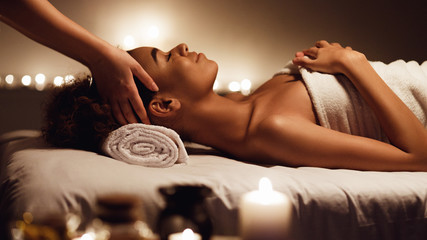Massage therapists utilize their hands, fingers, and elbows to manipulate soft tissue to promote relaxation and alleviate pain. Some also use specialized tools.
Many states require a license to practice. Licensing requires meeting educational and state-specific requirements, including passing a professional exam. Visit https://www.flowstate918.com/ to learn more.
Having too much stress and anxiety can contribute to depression, as well as other physical ailments. It’s not always possible to eliminate all of the stresses in your life, but massage therapy can help to alleviate some of these feelings. People who suffer from chronic pain, fibromyalgia and other conditions that cause stress or anxiety often find relief from the deep pressure and comforting touch of a skilled massage therapist.
Several studies have found that massage decreases physiological measures of stress. These include salivary cortisol, heart rate and blood pressure. However, these studies are generally small and don’t have the rigor of a clinical trial that could prove efficacy in a specific patient population. Nonetheless, these studies provide sufficient evidence that massage is effective in reducing stress and anxiety.
The body has two nervous systems: the sympathetic, which activates the “fight or flight” response in stressful situations; and the parasympathetic, which focuses on routine and day-to-day activities that promote relaxation and rest. A person who experiences too much stress can have increased levels of epinephrine and norepinephrine, which are indicators of sympathetic activity. Massage therapy can decrease the production of these hormones, as well as decrease circulating cortisol. It can also increase the levels of serotonin and dopamine, which are neurotransmitters that stabilize mood.
It’s important to note that if you suffer from a health condition that causes you to have a high level of cortisol, massage may not be the right treatment for you. In such cases, you should consult your doctor before undergoing this type of therapy.
There are many different types of massage, but some are better for relieving stress and anxiety than others. For example, trigger point massage, which involves the kneading of muscles to release knots and relieve tension, is very effective at reducing stress and anxiety. Deep tissue massage can also be helpful in easing anxiety, as it releases the tight muscles in the neck and back.
Some people who experience a lot of stress or anxiety are afraid to try massage because they think it will be painful or embarrassing, but this is not the case. Most people report feeling relaxed and calm after a massage, and many describe the process as enjoyable or even pleasurable. This is because massage has been shown to reduce stress and anxiety in the same way that it relieves physical pain. In addition, a massage can be very relaxing for the recipient, as it provides a safe and nurturing place to physically rest. It can feel like an hourlong hug, which is soothing and comforting. This type of soothing touch can decrease feelings of loneliness, sadness and isolation that often lead to depression. In fact, studies have found that mothers who massage their infants have a stronger bond with them than moms who don’t.
Helps Relieve Pain
Many people who suffer from chronic pain find relief with massage therapy. Massage involves manipulating the body’s soft tissues – muscles, ligaments, tendons and skin – using techniques such as kneading, tapping, stroking, friction, vibration, compression, and stretching. It may help patients relax, reduce stress and pain, lower blood pressure, and improve circulation. It also is being studied in the treatment of cancer symptoms such as lack of energy, pain and swelling.
The results of a recent study showed that therapeutic massage significantly improved pain levels, even in advanced stages of disease. The research also suggested that pain-killing medications did not provide as much benefit for patients as the massage.
One reason that massage relieves pain is that it releases tense muscles. Tension can result from physical injury, comorbid health conditions or simply the stress of living with chronic pain. Tight muscles limit the range of motion in joints, which can exacerbate pain and stiffness. Massage also increases the lubrication in the joints and allows fluids to move more freely, which can alleviate pain.
Another way massage relieves pain is by unblocking nerves. Tight muscles can compress the nerves around them, which blocks the transmission of pain signals to the brain. Massage can release these muscles, which allows the nerves to function normally again and transmit pain-free signals to the brain.
In addition to reducing pain, massage can help patients feel more relaxed and improve their sleep patterns. These effects can ease the stress that accompanies chronic pain, which in turn can help with healing. It is important to note, however, that a patient should be screened by their doctor before receiving any type of massage. Some types of massage are not recommended for certain individuals, including deep tissue massage and trigger point therapy.
A massage therapist must have completed an approved training program, pass a background check and be licensed to practice in the state where they work. There are a variety of ways to become a massage therapist, including taking courses at community colleges and vocational schools. Obtaining a job as an apprentice or intern in a spa or clinic is also a great way to gain experience and build a client base.
Patients who receive massage therapy are often pleasantly surprised by how much better they feel after their sessions. They are able to sleep better, relax more and have less anxiety and stress. Massage can be used to treat a wide variety of illnesses, and it is becoming more commonplace in the medical setting as doctors recognize its benefits. In the past, chronic pain was typically treated with NSAIDs or opioids, but these medications have serious side effects, including liver failure and addiction. Massage therapy is safe for most people, but it should never be done over a broken bone or in areas of skin infection.
Helps with Sleep
A good night’s sleep is essential for a healthy body and mind. While everyone has a sleepless night now and then, chronic insomnia and sleep disorders can lead to health problems such as diabetes, cardiovascular disease, and obesity. Many experts have found that massage therapy is effective in treating insomnia and promoting restful sleep.
Massage affects the nervous system by triggering your parasympathetic response. This reaction causes your body to relax and your heart rate to slow down, making it easier for you to fall asleep. Additionally, massage increases your melatonin levels, which is a chemical that signals to the brain it’s time for bed. In fact, researchers have discovered that those who receive massages twice a week for 30 minutes experience better quality sleep than those who don’t get regular massages.
Getting adequate sleep is also important for your immune system, which needs to be strong in order to fight off infection and disease. Research has shown that massage can stimulate your white blood cell count, which helps the immune system function optimally.
In addition to its pain relief, massage can help improve your sleep by reducing stress, improving blood circulation, easing tension and boosting mood. When a person is anxious or stressed, the body produces the hormone cortisol which can interfere with sleep patterns. Massage reduces the production of cortisol and stimulates the body to produce serotonin, a chemical that regulates circadian rhythms and induces sleep.
As a result of these effects, you can feel calm and relaxed after a session and may find it easier to fall asleep at night. In some cases, you may be able to sleep through the entire night.
When receiving a massage, it’s important to have open communication with your therapist. Tell him or her if the pressure is too intense, if you are uncomfortable with the temperature in the room or the music, or if the massage is causing any kind of discomfort. This will allow the therapist to adjust the technique or settings so that you can enjoy your massage.
If you are interested in improving the quality of your sleep, consider booking a massage appointment with one of our experienced massage therapists. Contact us today to schedule your appointment.
